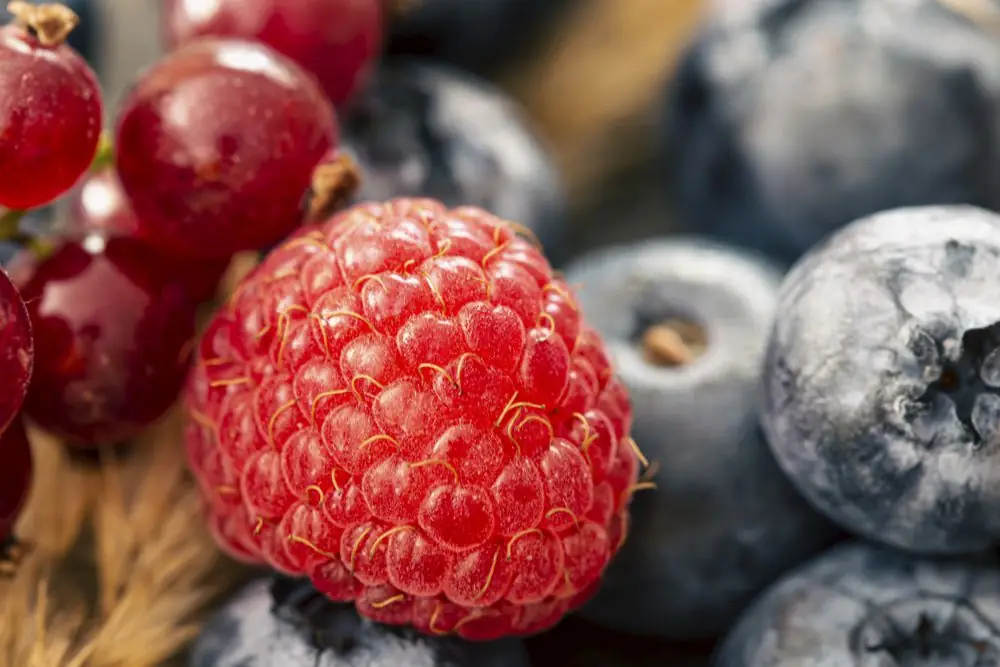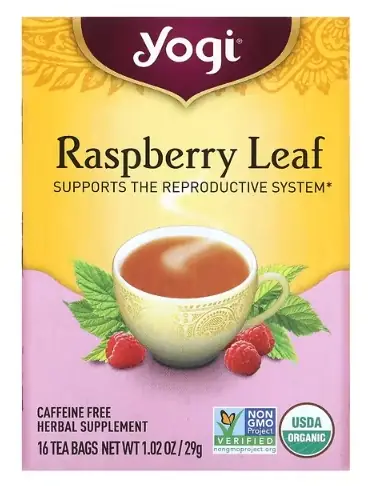What Are the Benefits of Eating Raspberries: A Review

Juicy and delicious, these berries are absolutely adored by both children and adults. What are the benefits of eating raspberries? What dietary minerals and vitamins are they rich in? Can you overdose on these berries? Why would you want to drink raspberry leaf tea?
Read on, and you will find the answers to all these and numerous other questions.

What Are the Benefits of Raspberries: Nutrition
Rich in vitamin C (ascorbic acid), these healthy berries are also an excellent source of manganese and dietary fiber.
Vitamin C Content
Raspberries are extremely rich in ascorbic acid: one cup (123 grams) of them contains a whopping 54% of the Recommended Daily Intake (RDI) of this vitamin. Ascorbic acid plays several important roles in the body:
- Required for the normal absorption of the so-called non-heme iron found in plant foods. Iron is crucially important for the transport of oxygen from the lungs to all cells of your body;
- Essential for collagen synthesis and wound healing: skin issues are among the most common symptoms of vitamin C deficiency;
- Boosts your immunity and speeds up recovery from such illnesses as the common cold and influenza;
- Act as a potent antioxidant and protects the cells of the body from free radicals;
- Required for the synthesis of several neurotransmitters: there are studies that support the hypothesis that vitamin C can lower the risk of the development of Alzheimer’s disease.

High in Manganese
Raspberries are one of the better food sources of manganese (41% of the RDI per cup). This essential mineral is required for numerous enzymes and proteins in the body; manganese is also crucial for normal bone formation and defense from free radicals. As pregnant women need to consume higher quantities of manganese, raspberries are well worth incorporating into their diet.
Dietary Fiber
Raspberries are also an excellent source of dietary fiber: indigestible carbohydrates that are highly important for your overall health. Among the numerous benefits of dietary fiber for the body are the following:
- Helps prevent obesity. While dietary fiber helps you feel full for a longer time, it also carries no calories, which makes food like raspberry a very good choice if you want to maintain your current weight or shed some pounds;
- Reduces cholesterol levels. Dietary fiber reduces cholesterol absorption: if you want to take care of your cardiovascular system, include raspberries in your daily menu;
- Prevents constipation. Dietary fiber adds bulk and weight to your stool, which stimulates the intestines and promotes regular bowel movements;
- Feeds good bacteria. Dietary fiber is prebiotic that helps good bacteria that live in your gut thrive.
- Helps avoid spikes in blood sugar. Raspberries and other foods high in dietary fiber take a longer time to be digested: this prevents your blood sugar levels from spiking.
- Reduces the risk of several types of cancer. Recent studies demonstrate that fiber-rich foods can protect you against several types of cancer, including colon cancer.

A cup of raspberries contains as many as 8 grams of dietary fiber which equals 21% of the RDI for adult men. Who said that maintaining good health cannot be delicious?
Caloric and Water Content
Among other important benefits of eating raspberries are their very low caloric content (only 3% of the RDI per cup) and the copious amounts of water they offer (105 grams per cup). A combination of dietary fiber and water is extremely important for staying regular; what’s more, eating raspberries helps you avoid hunger pangs while not overloading your body with empty calories.
Other Vitamins and Minerals
These berries also contain such essential minerals as iron, copper, magnesium, phosphorus, and zinc, as well as B vitamins and vitamin K, although concentrations of all these nutrients are not very high. Raspberry also features measurable quantities of plant protein.

Is Raspberry Healthy: Flavonoids
These berries also contain copious amounts of anthocyanins (47,6 mg per cup). A subclass of flavonoids, anthocyanins are natural pigments that make plants appear red, purple, blue, and black. Numerous studies demonstrate that flavonoids can help your health in a number of ways:
- Bind free radicals;
- Reduce inflammation;
- Slow down the development of atherosclerosis;
- Promote the production of nitric oxide, a compound that helps blood pressure normalization;
- Help to reduce blood pressure by inhibiting enzymes that do not allow blood vessels to relax;
- Improve insulin secretion
- Regulate DNA repair;
- Reduce neuroinflammation;
- Boost cognitive function.
Cancer-Preventing Properties
Scientists also hypothesize that eating raspberries offers such important benefits as delaying or even preventing the onset of several types of cancer.
In a 2010 test tube study raspberry extract was found to be effective against stomach, colon, and breast cancer cells. In a similar 2016 study an antioxidant extracted from raspberries killed 40% of ovarian cancer cells.

In a 2018 study on mice a diet that included raspberries was demonstrated to reduce the risk of stomach cancer development. A similar 2010 study on rats made it clear that raspberry extract can prevent the development of liver tumors.
Unfortunately, even though these findings are very promising, additional human studies are needed. Still, you lose absolutely nothing if you get into a habit of eating at least one cup of these berries a day, and their potential health benefits are enormous.
Anti-Inflammatory Properties
There are several animal studies that prove that these berries indeed have anti-inflammatory properties. In a 2012 study on rats, animals who were given raspberry extract demonstrated a lower risk of arthritis compared to the control group. In a 2014 study use of raspberry extract was linked to alleviating such symptoms of arthritis as swelling and joint destruction.
All in all, these berries make an excellent snack that you can consume between meals to feel satiated for a longer time. Delicious and full of important vitamins, dietary minerals, and bioactive compounds, they are impossible not to like!

What Do Raspberries Do for Your Body: an FAQ
In this section you will find the answers to the commonly asked questions about these healthy berries.
What Are the Benefits of Drinking Raspberry Tea?
Raspberry leaf tea is an excellent source of flavonoids (anthocyanins) and other bioactive compounds with pronounced antioxidant properties. Raspberry leaf tea was traditionally used in pregnancy (both to facilitate labor and to reduce such symptoms as nausea during early pregnancy). There is also anecdotal evidence that raspberry leaf tea can be used to treat symptoms of premenstrual syndrome.
Last but not least, a raspberry leaf tea is a viable alternative to caffeinated soft drinks as well as black and green teas. If you have trouble falling asleep after having drunk a cup of green or black tea before bed, switching to raspberry leaf tea can be a much better way to unwind at the end of the day.
Here is one of the highest-rated raspberry leaf teas on iHerb:
Raspberry Leaf Tea by Yogi Tea

- Contains nothing but organic raspberry leaf
- Non-GMO & organic
- 16 tea bags
What Are the Dangers of Eating Raspberries?
If you wonder what happens if you eat too many raspberries, the answer depends on whether you are determined enough to perform such an exploit.
First of all, any excess quantities of vitamin C are quickly removed from the bloodstream: you cannot overdose on ascorbic acid if you solely rely on food sources like raspberries.
An overabundance of dietary fiber in your daily menu can sometimes lead to such symptoms as flatulence and higher stool frequency. Still, an adult man needs to eat as many as five cups of raspberry per day to merely satisfy his needs in dietary fiber: this equals more than 600 grams (or 21 oz) of these berries which is not a type of diet most people would prefer.

As for flavonoids and manganese, you are extremely unlikely to overdose on them if you do not use dietary supplements. The tolerable upper intake for manganese is 11 mg per day which equals eating more than 13 cups of raspberries: quite a feat that not so many of us are capable of.
While it is sometimes said that raspberries contain salicylates (organic compounds related to aspirin) that can provoke allergic reactions in some people, actual concentrations of salicylates in raspberries and other plant foods are low. People who are aspirin-intolerant can usually eat foods that contain salicylates without limitations and risks of side effects. Still, if you suffer from a severe allergy to aspirin, you might want to consult your doctor to find out how many cups of raspberries you are allowed to eat daily.
So, the answer to the question of how many raspberries should I eat a day can be formulated like this: as long as you do not overindulge in these berries (i.e., eat 2 or 3 cups of them per day), eating raspberries is absolutely safe and offers numerous health benefits.

What Happens if You Eat Raspberries Everyday?
If you develop a habit of eating these delicious berries everyday, you will get these important benefits:
- Better immunity, healthier skin, improved iron absorption from higher vitamin C intake;
- Stronger bones from increased manganese intake;
- Intestinal health, improved regularity, body weight control from dietary fiber consumption;
- Protection from cancer development and systemic inflammation from anthocyanins;
- Protection from free radicals due to the combined action of vitamin C, manganese, and anthocyanins;
- Better hydration;
- An excellent non-caloric snack that is easy to enjoy between meals.
Now you know what are the health benefits of eating raspberries. Keep in mind, though, that no food by itself is a magic bullet: it is important that you maintain a balanced diet and exercise regularly.